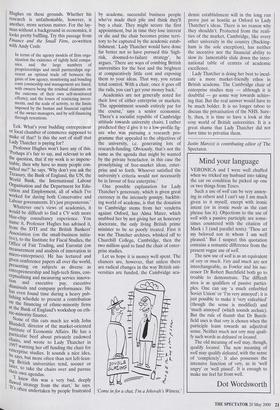Mind your language
VERONICA and I were well chuffed when we tricked my husband into taking the car on condition he picked up one or two things from Tesco.
Such a use of well can be very annoy- ing in others and I can't say I am much given to it myself, except with ironic intent (or in ironic mode as the cant phrase has it). Objections to the use of well with a passive participle are some- times countered with the citation of Mark i 3 (and parallel texts): 'Thou art my beloved son in whom I am well pleased.' But I suspect this quotation contains a semantic difference from the present vogue use of well.
The new use of well is as an equivalent of very or much. Very and much are not interchangeable, as Fowler and his suc- cessor Dr Robert Burchfield both go to trouble to demonstrate. The difficult area is as qualifiers of passive partici- ples. One can say 'a much enfeebled Soviet Union' or 'I'm very annoyed'; it is just possible to make it 'very enfeebled' (though the sense is modified) and `much annoyed' (which sounds archaic). But the rule of thumb that Dr Burch- field uses is that very is chosen when the participle leans towards an adjectival sense. Neither much nor very may quali- fy such words as defeated or located.
The old meaning of well may, though, qualify located. The new meaning of well may qualify defeated, with the sense of 'completely'. It also possesses the intensive function of very, as in 'well angry' or 'well pissed'. It is enough to make me feel far from well.
Dot Wordsworth









































































 Previous page
Previous page